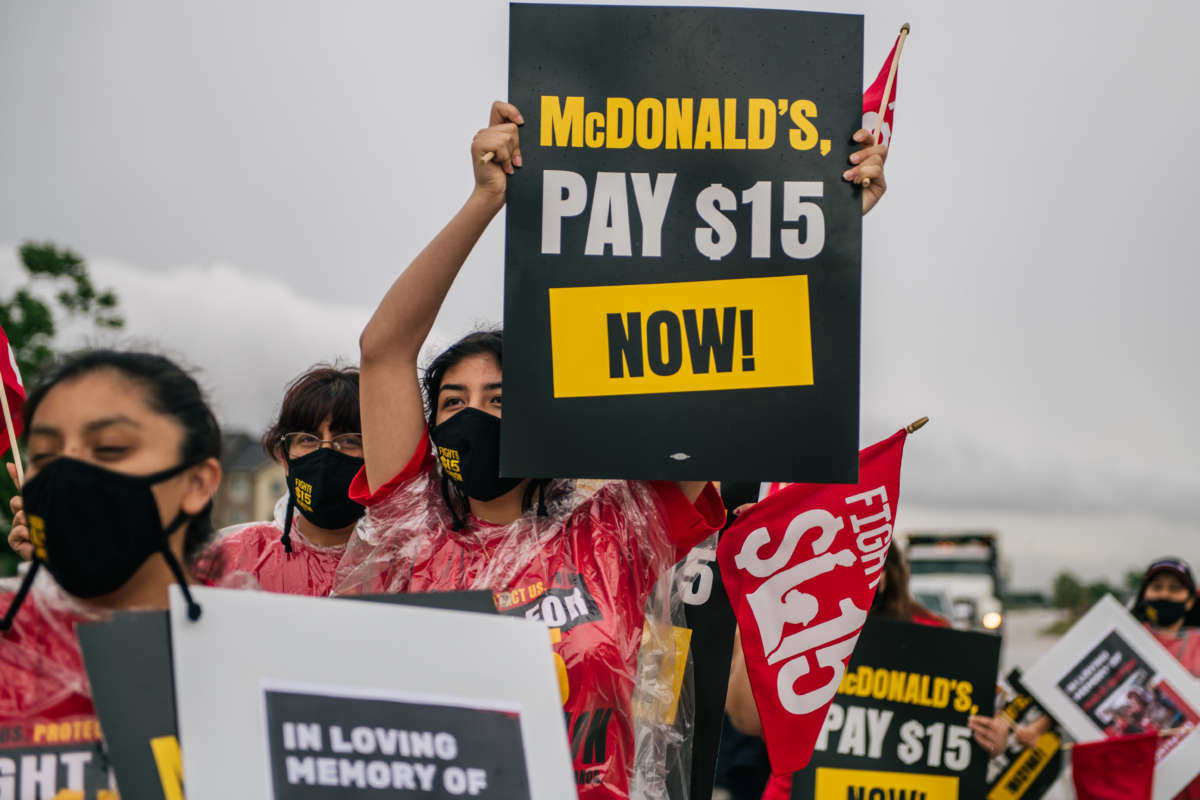Service workers from across the U.S. South signed union cards Saturday at the conclusion of a three-day summit in Columbia, South Carolina, where they agreed to join forces to combat exploitative corporations and the politicians who enable them.
The workers — who are employed at fast food restaurants, gas stations, retail stores, and other workplaces — joined the Union of Southern Service Workers (USSW), part of the Service Employees International Union (SEIU) and an affiliate of the nationwide economic justice group Fight for $15.
“With eyes wide open to the past and immense hope for a better future, we are building a union to fight for living wages, fair working conditions, and a voice on the job,” said Brandon Beachum, a Panera Bread worker from Atlanta. “We’re coming together and digging in for the long haul as a union because collective action is the best solution to improve our lives and support our families.”
The unionized workers held up their signed union cards while chanting, “We’re fired up, can’t take no more!”
Service workers from across the South are signing union membership cards to join the Union of Southern Service Workers (USSW)!
We’re getting organized to win real structural changes in our workplaces and communities.#OrganizeTheSouth #UnionsForAll pic.twitter.com/y5M6cKACG4
— Union of Southern Service Workers (@RaiseUptheSouth) November 19, 2022
The South has the lowest union density of any region in the U.S., with just 6% of workers represented by a collective bargaining unit. In South Carolina, only 1.7% of employees belong to a union.
Meanwhile, preemption laws — largely passed by majority-white legislatures across the South — have kept cities from raising wages for decades, leaving workers across the region struggling to make ends meet while earning as little as $7.25 per hour, even as more than 40% of the country lives in places where voters and lawmakers have approved a $15 per hour minimum wage.
The USSW includes people from a variety of jobs and workplaces “because companies across the South employ a low-wage, high turnover model,” said the group in a press statement.
“It is virtually impossible for fast food, care, retail, warehouse, and other workers to join a union through existing rules,” the USSW said.
The union launched with several demands for employers across the region, including:
- A seat at the table for workers to make decisions about working conditions, establish corporate accountability for treatment of workers, and ensure respect for workers’ right to organize free of retaliation;
- Fair pay and an end to wage theft across industries;
- Dignity and equal treatment, including equal pay for all workers and protection from discrimination and harassment;
- Health and safety through healthcare benefits, sick leave, and safe workplace protections and equipment; and
- Fair and consistent scheduling, including the ability to work full time hours with safe staffing levels, and regular weekly schedules.
The summit was held as high-profile fights for workers’ rights continue at workplaces including Starbucks, the University of California, and HarperCollins Publishers.
Low-wage workers in the South face a deeply entrenched history of racially discriminatory labor practices. Agricultural and domestic workers were excluded by racist Southern Congress members from labor laws passed in the 1930s, including the Fair Labor Standards Act of 1938 and the National Labor Relations Act of 1935.
Considering the region’s history of leaving largely-Black workforces out of landmark labor laws, said Terrence Wise, a fast food worker and Fight for $15 leader, “it’s no surprise that nearly 80% of workers in South Carolina make less than $15 per hour.”
“Over the past 10 years, we’ve won raises for 26 million workers in this country. I’m talking about 150 billion in the pockets of workers…” – Terrence Wise, @tacobell worker pic.twitter.com/lxNeanGKc8
— Union of Southern Service Workers (@RaiseUptheSouth) November 19, 2022
At the summit, attendees prepared to take collective actions as a union. They discussed the Southern Tenant Farmers Union, which included white and Black farm workers during the Great Depression; the 1969 strike by Black hospital workers in Charleston; and the Mississippi Freedom Labor Union, led by Fannie Lou Hamer.
“Black, brown and immigrant service workers across the South are leading the fight for a fundamental transformation of our economy and democracy aimed at re-writing outdated laws that have always held back working people and stopped them from gaining a voice through unions,” said Mary Kay Henry, president of the SEIU. “Together in the Union of Southern Service Workers, workers across states and workplaces in the South will become an unstoppable force that no union-busting corporation or racist politician dare ignore.”
Matching Opportunity Extended: Please support Truthout today!
Our end-of-year fundraiser is over, but our donation matching opportunity has been extended! Today, all donations to Truthout will be matched dollar for dollar. Your one-time gift today will be matched immediately. As well, your monthly donation will be matched for the whole first year, doubling your impact.
This matching gift comes at a critical time. Trump has made it no secret that he is planning a demolition-style attack on both specific communities and democracy as a whole, beginning on his first day in office.
Help us prepare for Trump’s Day One, and have your donation matched today!
